2018秋牛津深圳版(广州沈阳通用)七年级英语上册课件:Module 4 Fun time Unit 8 collecting things 课件(共90张PPT)
文档属性
| 名称 | 2018秋牛津深圳版(广州沈阳通用)七年级英语上册课件:Module 4 Fun time Unit 8 collecting things 课件(共90张PPT) |
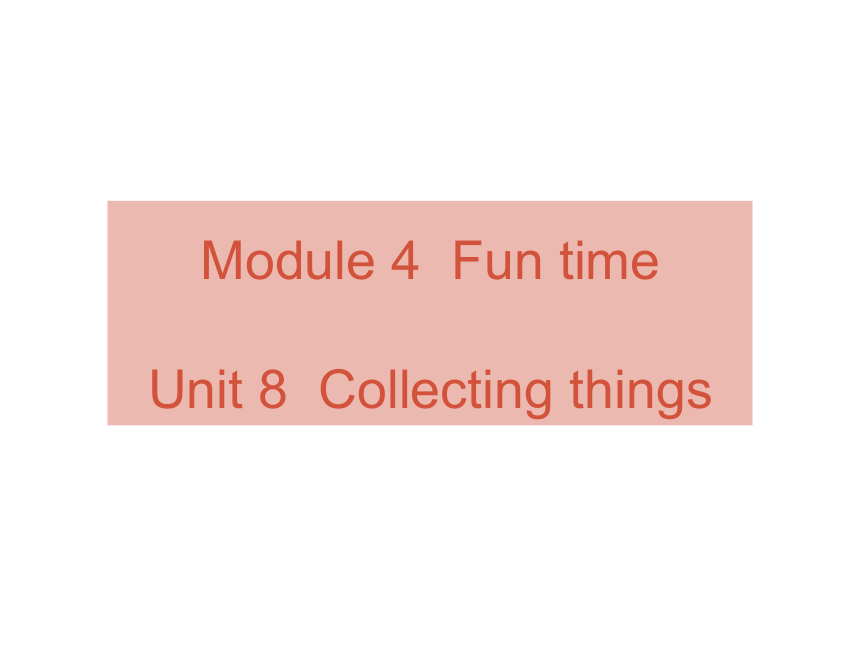
|
|
| 格式 | zip | ||
| 文件大小 | 373.9KB | ||
| 资源类型 | 教案 | ||
| 版本资源 | 牛津深圳版 | ||
| 科目 | 英语 | ||
| 更新时间 | 2019-02-22 00:00:00 | ||
图片预览

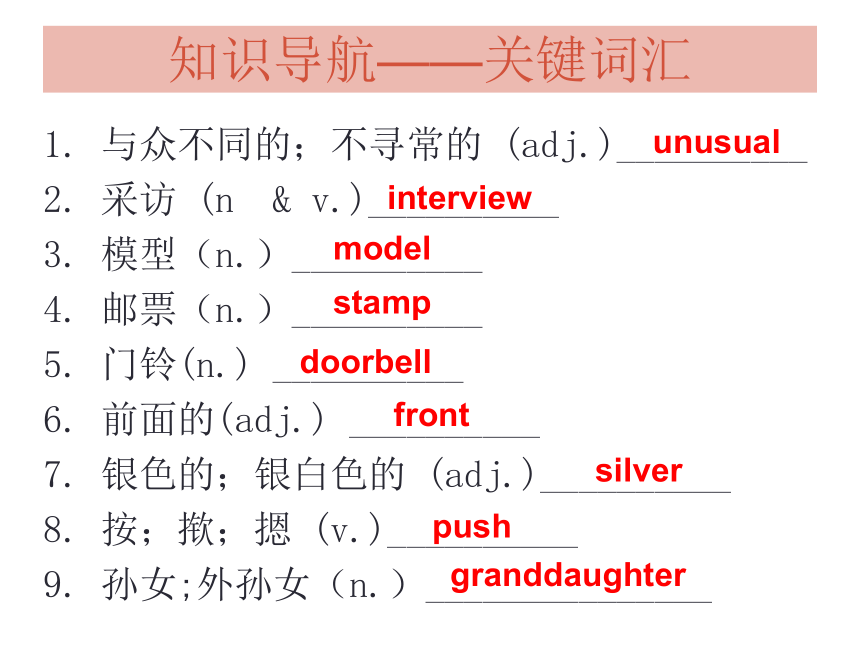
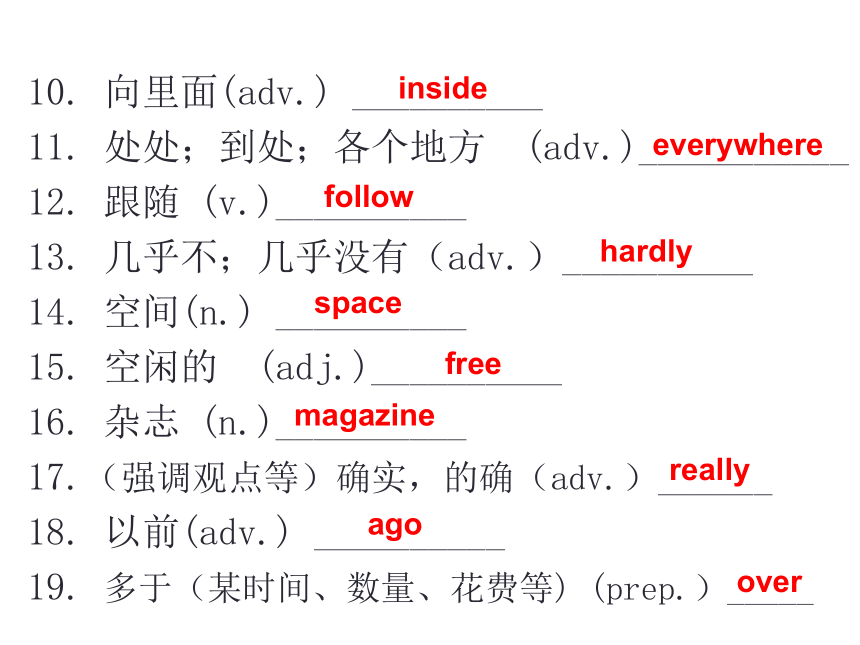
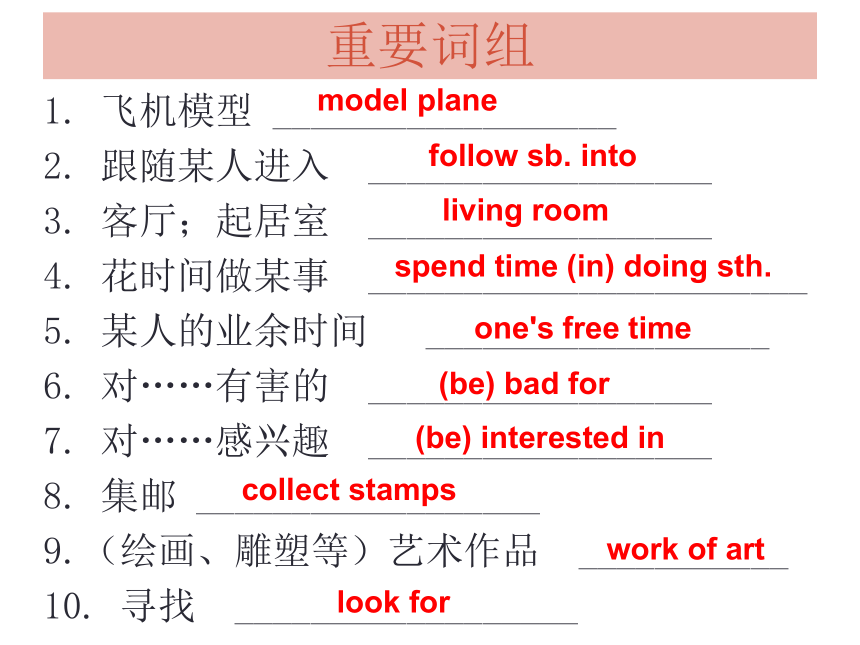
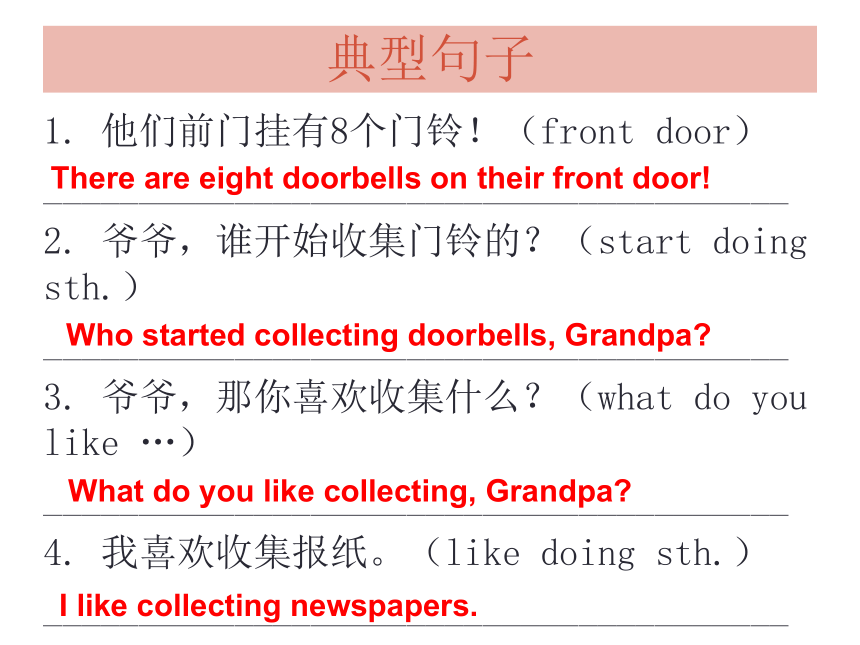
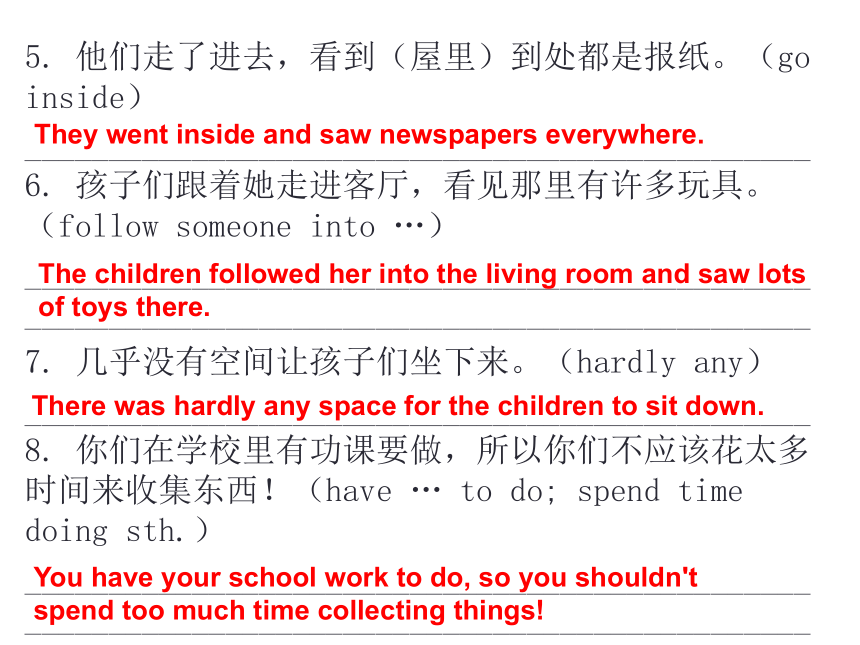

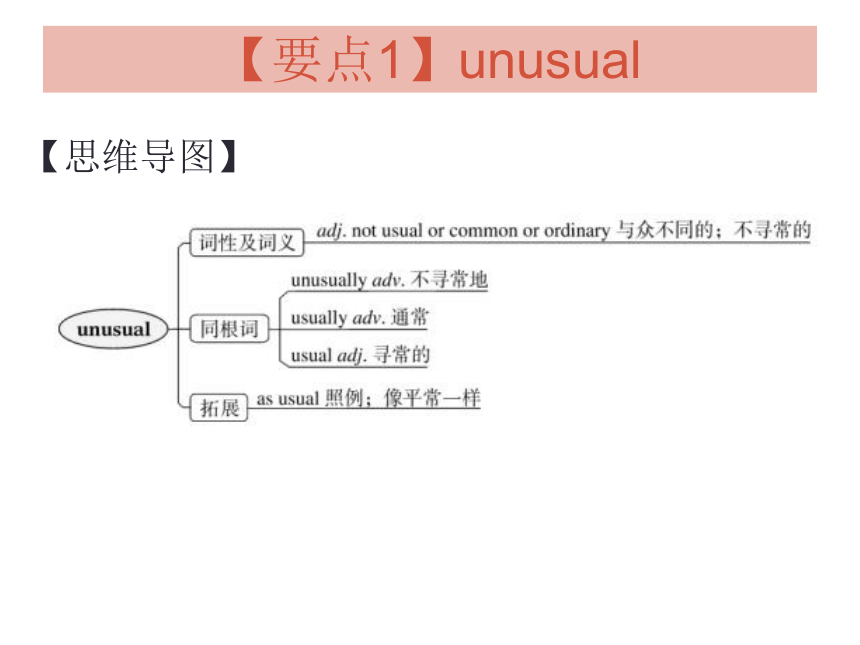
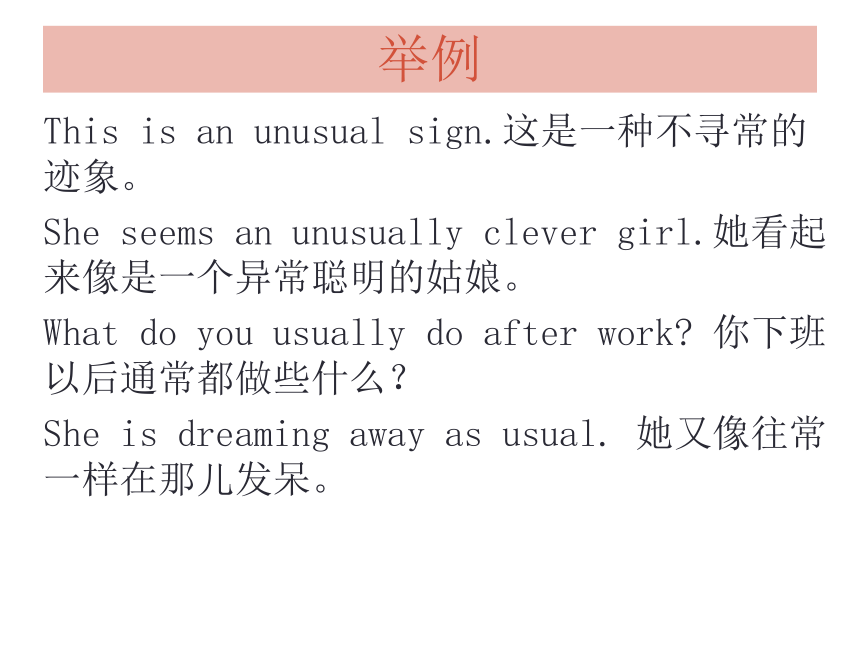

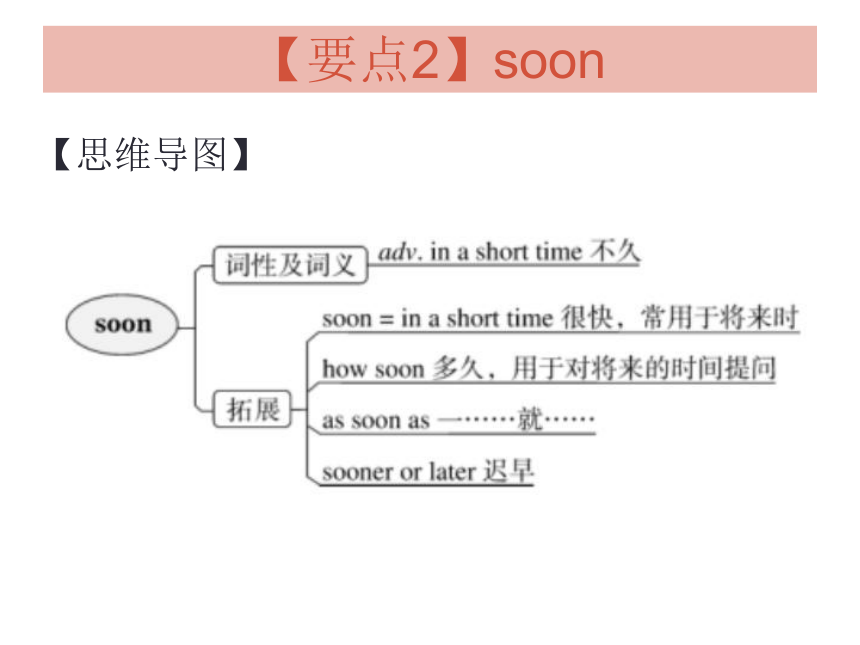
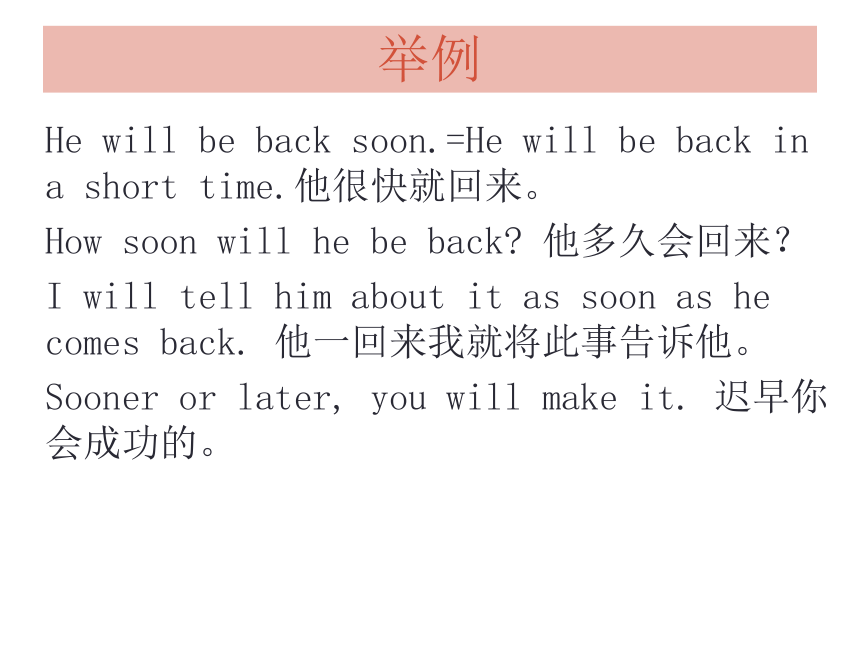
文档简介
课件90张PPT。Module 4 Fun time
Unit 8 Collecting things知识导航——关键词汇1. 与众不同的;不寻常的 (adj.)__________
2. 采访 (n?& v.)__________
3. 模型(n.)__________
4. 邮票(n.)__________
5. 门铃(n.) __________
6. 前面的(adj.) __________
7. 银色的;银白色的 (adj.)__________
8. 按;揿;摁 (v.)__________
9. 孙女;外孙女(n.)_______________unusualinterviewmodelstamp doorbellfrontsilverpushgranddaughter10. 向里面(adv.) __________
11. 处处;到处;各个地方 (adv.)___________
12. 跟随 (v.)__________
13. 几乎不;几乎没有(adv.)__________
14. 空间(n.) __________
15. 空闲的 (adj.)__________
16. 杂志 (n.)__________
17.(强调观点等)确实,的确(adv.)______
18. 以前(adv.) __________
19. 多于(某时间、数量、花费等) (prep.)_____insideeverywherefollowhardlyspacefreemagazinereallyagoover重要词组1. 飞机模型 __________________
2. 跟随某人进入 __________________
3. 客厅;起居室 __________________
4. 花时间做某事 _______________________
5. 某人的业余时间 __________________
6. 对……有害的 __________________
7. 对……感兴趣 __________________
8. 集邮 __________________
9.(绘画、雕塑等)艺术作品 ___________
10. 寻找 __________________model planefollow sb. intoliving roomspend time (in) doing sth.one's free time(be) interested incollect stampswork of artlook for(be) bad for典型句子1. 他们前门挂有8个门铃!(front door)
_______________________________________
2. 爷爷,谁开始收集门铃的?(start doing sth.)
_______________________________________
3. 爷爷,那你喜欢收集什么?(what do you like …)
_______________________________________
4. 我喜欢收集报纸。(like doing sth.)
_______________________________________There are eight doorbells on their front door!Who started collecting doorbells, Grandpa?What do you like collecting, Grandpa?I like collecting newspapers.5. 他们走了进去,看到(屋里)到处都是报纸。(go inside)
_______________________________________________6. 孩子们跟着她走进客厅,看见那里有许多玩具。(follow someone into …)
______________________________________________________________________________________________
7. 几乎没有空间让孩子们坐下来。(hardly any)
_______________________________________________8. 你们在学校里有功课要做,所以你们不应该花太多时间来收集东西!(have … to do; spend time doing sth.)
______________________________________________________________________________________________They went inside and saw newspapers everywhere.The children followed her into the living room and saw lots of toys there.There was hardly any space for the children to sit down.You have your school work to do, so you shouldn't spend too much time collecting things!第1课时 Vocabulary【要点1】unusual【思维导图】举例This is an unusual sign.这是一种不寻常的迹象。
She seems an unusually clever girl.她看起来像是一个异常聪明的姑娘。
What do you usually do after work? 你下班以后通常都做些什么?
She is dreaming away as usual. 她又像往常一样在那儿发呆。应用(1)He goes out to have a walk after dinner as _________ (unusual).
(2)He _________ (unusual) goes out to have a walk after dinner.
usualusually【要点2】soon【思维导图】举例He will be back soon.=He will be back in a short time.他很快就回来。
How soon will he be back? 他多久会回来?
I will tell him about it as soon as he comes back. 他一回来我就将此事告诉他。
Sooner or later, you will make it. 迟早你会成功的。应用(1)( )—How soon will he be back?
— .
A. On two hours B. After two hours
C. In two hours
(2)( )As soon as he enough money, he the book.
A. has; buys B. has; will buy
C. will have; will buy
CB【要点3】everywhere【思维导图】举例New factories are going up everywhere. 到处在兴建新工厂。
You can see newspapers everywhere?=You can see newspapers here and there.你可以看到到处是报纸。应用
( )There are books everywhere.(选出可以替换画线部分的最佳选项)
A. outside
B. over there
C. here and there
C【要点4】free【思维导图】举例We have a lot of free time. 我们有很多空闲的时间。
Everyone loves freedom. 每个人都热爱自由。
The tourists went about London freely. 游客们在伦敦四处自由游览。应用(1) ________ (free) is important to everyone.
(2) ( )Tom is free now. We can play basketball together.(选出可以替换画线部分的最佳选项)
A. not busy
B. busy
C. poor
Freedom A【要点5】over【思维导图】举例There are over 20 students here. =There are more than 20 students here. 这里有超过二十名学生。
The class is over. =The class ends. 这节课结束了。
应用(1) ( )Tom is over thirteen. He is a middle school student now.(选出可以替换画线部分的最佳选项)
A. less than B. more than
C. almost
(2)( )It's 5 p.m. The last class is .
A. end B. finish
C. over
BC【要点6】be bad for【思维导图】举例My teacher told me smoking was bad for our health. 我的老师告诉我吸烟有害健康。
Vegetables are good for our health.蔬菜对我们的健康有益。
She is bad at Physics. 她不擅长物理。应用( )Watching TV too much is bad
your eyes.
A. to
B. for
C. at
B【要点7】be interested in【思维导图】举例I'm interested in traditional books. 我对传统书籍感兴趣。
He is interested in playing football.= He has an interest in playing football.= He really likes playing football.他对踢足球感兴趣。
The football match made me interested in playing football. 这个足球比赛使我对踢足球感兴趣。应用(1)He is __________ (interest) in reading books.
(2)He has an __________ (interest) in reading books.
(3) ( )Tom is interested in reading books.(选出可以替换画线部分的最佳选项)
A. is good at
B. does well in
C. really likesinterested interestC课堂练习一、根据要求写出相应的单词
1. usual ________________ (反义词)
2. grandson ________________ (复数形式)
3. model ________________ (复数形式)
4. real ________________ (adv.)
5. busy ________________ (反义词)
6. follow ________________ (过去式)
7. outside ________________ (反义词)
8. push ________________ (第三人称单数)
9. stamp ________________ (复数形式)
10. interviewer ________________ (v.)unusualgrandsons modelsreally freefollowedinsidepushesstampsinterview二、词汇测试i. 从下面每小题的A、B、C三个选项中选出可以替换画线部分的最佳选项。
( )1. —Hurry up, or we will be late.
—Don't worry. We can get to the cinema soon.
A. in a short time B. in time C. finally
( )2. —How many tourists are there on the Great Wall during the holiday?
—There are over 100 thousand tourists.
A. around B. more than C. less than A B( )3. —So many people here! You should follow me.
—OK, I will!
A. walk to B. go with C. go after
( )4. —What do you usually do on Saturdays?
—My father is free on Saturdays and he often takes us to the park.
A. not busy
B. happy
C. nervous C A( )5. —What did you like when you were a child?
—I was interested in drawing when I was five.
A. kept on B. was fond of
C. looked forward to
( )6. —Look at your room! There are dirty socks and shoes everywhere.
—I will tidy it up later.
A. all the way B. from other people
C. all over the roomB C( )7. —Going to bed late is bad for people's health.
—I agree with you.
A. is good at B. is not good for
C. is able to
( )8. —What does he like to do on weekends?
—He really likes to spend the weekends with his parents at home.
A. finally B. truly C. usuallyB Bii. 根据句子意思,从下面每小题的A、B、C三个选项中选出恰当的词语完成句子。
( )9. A is a representation of something, usually smaller than the original(原物).
A. model B. doorbell C. space
( )10. When you something, you press it.
A. interview B. follow C. pushA C( )11. —May I use your dictionary, please?
—Sorry. My dictionary is missing. I've looked for it but I haven't found it yet.
A. everywhere B. over C. all the way
( )12. —The weather is so bad that they could go out for a walk.
—What a pity!
A. nearly B. hardly C. easilyA B( )13. —Who was the first student
at the meeting?
—Daniel. He gave us great talk.
A. speaking; a B. to speak; a
C. spoke; the
( )14. —There is any space for us to sit down in the room.
—Let's to the garden and have some tea there.
A. almost; go B. not; to go
C. hardly; goB C( )15. —The programme is very popular.
— . We all like it.
A. That's right
B. Not at all
C. It doesn't matterA第2课时 Reading【要点精讲】 【要点1】There was hardly any space for the children to sit down. 几乎没有空间让孩子们坐下来。 【用法】
There is hardly any … for sb. to do sth. 意为“某人几乎没有……来做某事”。
There is hardly any food for us to eat.我们几乎没有能吃的食物了。拓展(1) hardly=almost not
There was hardly any space for the children to sit down?=There was almost not any space for the children to sit down. 几乎没有空间让孩子们坐下来。
(2) hardly,never, seldom等都是表示否定的词。
He is never late for school. 他上学从不迟到。
She seldom shows her feelings. 她很少表达她的情感。
应用(1)( )The boy hardly believed the news was true.(选出可以替换画线部分的最佳选项)
A. almost
B. usually
C. almost not
(2)几乎没有什么钱让我去买礼物了。(根据汉语意思补全句子)
There is _________ any money for me _________ _________ presents.C hardly to buy【要点2】… so you shouldn't spend too much time collecting things! ……所以你们不应该花太多时间来收集东西! 【用法】(1)spend time doing sth. 表示“花时间做某事”。
Do you spend much time staying with your family? 你花很多时间与家人待在一起吗?
(2)too much 意为“太多”,用来修饰不可数名词。
He drank too much beer last night. 昨晚他喝太多啤酒了。
拓展spend time / money on sth. 在某事物上花时间 / 金钱
spend time / money(in) doing sth. 做某事花时间 / 金钱
辨析 too much, much too 与too many 的区别:(1)too much意为“太多”,用于修饰不可数名词。
We have too much work to do.我们有太多的工作要做。
(2)much too表示“太”,用来修饰形容词或副词。
It's much too cold.天气太冷了。
(3)too many意为“太多”,用于修饰可数名词的复数。
There are too many students in our class. 我们班上有太多的学生。
应用(1)( )He doesn't spend much time
his homework.
A. do B. to do
C. doing
(2)( )—Mum, the soup is salty.
—Sorry, dear. I've put salt in it.
A. too much; a lot
B. many too; a lot of
C. much too; too muchCC课堂练习一、用所给单词的适当形式填空
1. This passage is very short. It has only ten ___________ (sentence).
2. He took some ___________(magazine) and planned to read them in the train.
3. This movie is ________ (real) funny. I want to see it again.
4. There isn't ________(something) in my bag.
5. He ________(start) collecting stamps two years ago.sentencesmagazinesreallyanythingstarted6. He goes out to run before breakfast as _________ (unusual).
7. As a _________ (son), he takes care of his grandmother when his parents are away.
8. Lucy is so weak that she _________ (hard) finishes the 1,500 metres race.
9. He is _________(interest) in playing the violin.
10. I didn't spend too much time _________ (play) computer games.usualgrandsonhardlyinterestedplaying二、阅读理解 Tom is twelve years old, and he is interested in collecting stamps. He began to collect stamps when he was seven years old. He spends all his pocket money on stamps. Sometimes his parents send him stamps when he does well in his study. Therefore, Tom collects a lot of stamps. He often shows his stamps to his friends and his neighbours. He usually goes to his mail box to get letters after school. He wants the stamps from them. One day, Tom went to the mail box to get letters. But there were no letters in his box. He found a letter in the box next to his. The letter was to Mrs May. There was a beautiful stamp on the letter. So he got off the stamp carefully and hurried home. After he went home, he was afraid that Mrs May would know he got her stamp.
On the morning of the next day, Tom put the stamp back to Mrs May's box andthen went to school. When he came back from school, he met Mrs May. She smiled to Tom. Tom smiled, too.
( )1. Tom began to collect stamps when he was .
A. 12 B. 5 C. 7 D. 17
( )2. His parents send him stamps when .
A. it's his birthday
B. he is ill
C. he does bad in his study
D. he does well in his study C D( )3. Tom often goes to his mail box to .
A. send a letter
B. show his stamps to his friends
C. get letters
D. collect letters
( )4. Which is not the way to collect stamps by Tom?
A. He uses pocket money to buy stamps.
B. Sometimes his parents give him stamps.
C. He gets stamps from his letters.
D. He gets off stamps from others' letters. C D第3课时 Grammar语法聚焦 代词常用于代替名词以及承担名词作用的短语、不定式、动词的-ing形式、从句或句子。在英语中代词用得极为广泛。英语中的代词分为九类:人称代词、物主代词、反身代词、指示代词、相互代词、疑问代词、不定代词、关系代词和连接代词。在本单元,我们重点学习人称代词和物主代词。
一、人称代词
1. 人称代词用来指代前面谈论到的名词,根据其在句中的作用,可分为主格和宾格。
2. 人称代词的主格一般在句中作主语。
I am a student. 我是一名学生。(I作主语)You can do it by yourself. 你可以自己去做。(you作主语)
They went to the park. 他们去了公园。(they作主语)
3. 人称代词的宾格一般在句中作及物动词或介词的宾语。
My mother loves me very much. 我妈妈非常爱我。(me作宾语)
My mother is friendly to them. 我妈妈对他们很友好。(them作宾语)
4. 人称代词通常是“二、三、一” 的顺序。You, he and I will have much work to do. 你、他、我将会有很多工作要做。
二、物主代词
1.物主代词可分为形容词性物主代词和名词性物主代词。
2.形容词性物主代词一般作定语,后面接名词。
This is my book. 这是我的书。 (my作定语)
What is your name? 你的名字叫什么? (your作定语)
We can see her book on the desk. 我们可以看到她的书在桌子上。(her作定语)
3.名词性物主代词可作主语、表语、宾语等,后面不能接名词。
Yours is over there. 你的在那里。(yours作主语)
This book is mine. 这本书是我的。 (mine作表语)
My bike is broken. Can I borrow yours? 我的自行车坏了。我能借你的吗?(yours作宾语)
课堂练习一、用所给单词的适当形式填空
1. I will go swimming with a friend of _______(I).
2. There is a man under the tree, but I can't see _______ (he) clearly.
3. This ball is not _______ (their). It is _______(our).
4. _______ (they) parents are both teachers in a junior high school.
5. Can _______(you) show me _______ (you) watch?minehimtheirsours Theiryouyour6. _______(we) English teacher is Mrs Green.
7. Look! The chair lost one of _______ (it) legs.
8. I want to buy _______ (she) a yellow skirt tomorrow.
9. Mike can't get down from the tree. Can you help _______(he)?
10. The car in front of the bank is not _______(he).Ouritsherhimhis二、单项选择( )1. There is a cup of tea. Please pass to me. (2017泸州)
A. one B. it
C. this D. that
( )2. —Does Miss White like sports?
—Yes, favourite sport is tennis. (2017济南)
A. he B. she
C. his D. herB D( )3. Jessica used to be a manager at a big company, but she gave up job when she became a mother.(2017广东)
A. she B. hers
C. her D. herself
( )4. —Our skirts look the same.
—Yes, but looks newer. (2017衢州)
A. your B. yours
C. you D. yourself
C B( )5. I'm going skating. Would you like to go with ? (2017阜康)
A. me
B. I
C. my
D. mine
A三、语法填空 What do people like to do in their free time? In fact, people have different kinds of 1. ________ (hobby) in their lives. When they are very young, they spend much time 2. ________ (play) with dolls or toy cars. They also enjoy
3. _________(draw) pictures or building houses 4.________ wooden blocks(积木). When they get a little older, they stop doing 5. ________ (that) things. They have got new hobbies. Some people like tohobbies playingdrawingwiththosedo sports like playing football or going
6. ________ (skate) outside. They can breathe the fresh air 7. ________they can also make friends with others. Some people become 8. ________ (interest) in other activities such as painting and stamp collecting. And others love singing, dancing, playing 9.________ guitar or some other things. Some people may change
10.________ (they) hobbies, but some people keep the same hobby all the time.
skatingandinterested thetheir第4课时 Listening and speaking口语无忧 本单元我们学习了关于收藏自己喜欢的东西的话题。那么,现在让我们一起围绕“收藏物品”这一话题展开口语练习吧!
话题八 收藏物品
【1】相关词组(请大声朗读以下词汇,看谁读得更标准地道)
unusual, interview, model, stamp, newspaper, everywhere, follow, hardly, space, free, living room,collect,postcard【2】你问我答
A. 请运用下列句子与你组内的一个同伴(四人小组)进行你问我答,然后互换角色,再进行问答。
1. Do you collect anything?
2. What do you collect?
3. How big is your collection?
4. Can I see your collection now?
5. Why do you like collecting them?
B. 接下来,在小组内换一个同伴相互问答。【情景说话】
假设你和同学聊到关于收藏一些自己喜欢的东西的话题。请模仿下列形式跟你的组员进行对话。
You: Hello, Shelly. Do you collect anything?
Your group member: Yes, I collect postcards.
You: When did you start collecting them?
Your group member: I started four years ago.
You:Which is your favourite postcard?
Your group member: My favourite postcard is from the US. It has a picture of the Statue of Liberty on it.
…
接下来,请你向全班同学介绍有关你自己喜欢的收藏。
Report like this:
_________________________________________________________________________________________________________________________________________________________________________________________________________________________________________________________________________________________________________________________________________________________________________________________________
Hi, everybody. Today I am going to tell you something about my collection. I like collecting coins very much. I started collecting coins at the age of ten. Now I have about 1,500 coins from all over the world. Ben gives me American ones and I get British ones from Sally. Collecting coins brings me a lot of fun. I can know what the coins are like in different countries in different times.课堂练习一、补全对话
A. I started this hobby at the age of twelve.
B. I collect leaves.
C. Would you like to watch my collection?
D. They are from different trees.
E. Why do you like collecting leaves?A: Do you collect anything?
B: Yes. 1.__________
A: Wow, that's very interesting. 2._____
B: Because leaves have different kinds of shapes and colours. Every kind of tree has its own unusual leaves.
A: When did you begin to collect them?
B: 3. ________
A: How many leaves do you have now?
B: About 1,000 leaves. 4. ________B E A D A: Where do you put them?
B: I put them in notebooks. 5. ________
A: Yes. I want to see how beautiful they are!C二、思维导图复述 根据教材P101的课文内容完成下面的思维导图,再根据思维导图,复述该篇课文的内容。everythingcollecting doorbellscollecting newspaperscollecting toysshouldn't spend
too much time课文复述:
__________________________________________________________________________________________________________________________________________________________________________________________________________________________________________________________________________________________________________________________________________________________________________________
Sam and Helen's grandparents collect almost everything. Grandma started collecting doorbells and there are eight doorbells on their front door. Grandpa likes collecting newspapers. They both like collecting toys and there are lots of toys in their living room. But they don't think students should spend too much time collecting things, because they have their school work to do.第5课时 Writing写作乐园话题八 我的收藏品
【短文写作】
很多人都有收藏东西的爱好。请你以“My Collection”为题写一篇短文。
内容包括:
1. 你的收藏爱好是什么?描述一下你的收藏品。
2. 你从何时开始有此爱好?你的第一个收藏品是怎么得到的?
3. 你为何收藏这样的东西?作文要求:
1.词数:60词左右(标题已给出,不计入总词数)。
2. 文章必须包含所有提示内容,并可作适当发挥。
3. 条理清楚,语句通顺,意思连贯,书面规范。
My Collection
___________________________________________________________________________________________________________________________
【写作指导】
此篇作文以谈论收藏为主线,主要内容是谈论个人的收藏爱好、原因及收藏品的来源。写作内容渗透着本单元的话题和语言目标——谈论个人的收藏爱好、收藏品、收藏的意义。
写作过程中要明确以下几点:
1. 由作文要谈的内容“my collection”决定我们在写作中要以一般过去时和一般现在时为主。
2. 从话题内容看,我们会大量用到表达收藏的短语和句型。【范文赏析】
My Collection
I like collecting stamps. It brings me a lot of fun. I started collecting stamps at the age of 8. My first stamp was from my father. He gave it to me as a new year present. The stamp has a picture of monkey on it. This made me interested in stamps. Soon I started to look for more stamps. Now I have more than 50 stamps. From the stamps, I learn a lot about Chinese culture. Collecting stamps brings not only knowledge but also friends. It makes me happy.课堂练习一、写作仿写
1. a collector of … ……的收藏者
【例句】He is a collector of works of art. 他是艺术品的收藏者。
【仿写】(汉译英)
(1)艾伦是一名铅笔收藏者。
______________________________________
(2)我是贝壳的收藏者。
______________________________________Alan is a collector of pencils.I'm a collector of seashells.2. doing sth. is+adj.做某事是……的
【例句】Doing morning exercises is good for our health. 做早操对我们的身体健康有益。
【仿写】(汉译英)
(1)收集贺卡很有趣。
______________________________________
(2)学习英语很重要。
______________________________________Collecting cards is very interesting.Learning English is very important.3. be interested in 对……感兴趣
【例句】He is interested in fishing.他对钓鱼很感兴趣。
【仿写】(汉译英)
(1)他对阅读很感兴趣。
______________________________________
(2)我对收集钥匙环感兴趣。
______________________________________He is interested in reading books.I am interested in collecting key rings.二、书面表达 Paul和Simon 都有收藏的爱好。请根据下表内容,从收藏品、数量、开始时间及收藏原因等方面,写一篇短文介绍一下Paul和Simon的收藏爱好。作文要求:
1.词数:60词左右。
2. 文章必须包含所有提示内容,并可作适当发挥。
3. 条理清楚,语句通顺,意思连贯,书面规范。____________________________________________________________________________________________________________________________________________________________________________________________________________________________________________________________________________________________________________________________________
________________________________________________________________________
Many of my friends have collections. One of my friends, Paul, likes collecting stamps. He started to be interested in it three years ago. He has about 370 stamps. They come from different countries. He says he can learn a lot about art and culture from the stamps. Another friend, Simon, is a collector of model cars. At the age of five, he began to collect them. He has 200 different model cars now. He likes cars a lot and wants to be a driver when he grows up.Thank you!
2. 采访 (n?& v.)__________
3. 模型(n.)__________
4. 邮票(n.)__________
5. 门铃(n.) __________
6. 前面的(adj.) __________
7. 银色的;银白色的 (adj.)__________
8. 按;揿;摁 (v.)__________
9. 孙女;外孙女(n.)_______________unusualinterviewmodelstamp doorbellfrontsilverpushgranddaughter10. 向里面(adv.) __________
11. 处处;到处;各个地方 (adv.)___________
12. 跟随 (v.)__________
13. 几乎不;几乎没有(adv.)__________
14. 空间(n.) __________
15. 空闲的 (adj.)__________
16. 杂志 (n.)__________
17.(强调观点等)确实,的确(adv.)______
18. 以前(adv.) __________
19. 多于(某时间、数量、花费等) (prep.)_____insideeverywherefollowhardlyspacefreemagazinereallyagoover重要词组1. 飞机模型 __________________
2. 跟随某人进入 __________________
3. 客厅;起居室 __________________
4. 花时间做某事 _______________________
5. 某人的业余时间 __________________
6. 对……有害的 __________________
7. 对……感兴趣 __________________
8. 集邮 __________________
9.(绘画、雕塑等)艺术作品 ___________
10. 寻找 __________________model planefollow sb. intoliving roomspend time (in) doing sth.one's free time(be) interested incollect stampswork of artlook for(be) bad for典型句子1. 他们前门挂有8个门铃!(front door)
_______________________________________
2. 爷爷,谁开始收集门铃的?(start doing sth.)
_______________________________________
3. 爷爷,那你喜欢收集什么?(what do you like …)
_______________________________________
4. 我喜欢收集报纸。(like doing sth.)
_______________________________________There are eight doorbells on their front door!Who started collecting doorbells, Grandpa?What do you like collecting, Grandpa?I like collecting newspapers.5. 他们走了进去,看到(屋里)到处都是报纸。(go inside)
_______________________________________________6. 孩子们跟着她走进客厅,看见那里有许多玩具。(follow someone into …)
______________________________________________________________________________________________
7. 几乎没有空间让孩子们坐下来。(hardly any)
_______________________________________________8. 你们在学校里有功课要做,所以你们不应该花太多时间来收集东西!(have … to do; spend time doing sth.)
______________________________________________________________________________________________They went inside and saw newspapers everywhere.The children followed her into the living room and saw lots of toys there.There was hardly any space for the children to sit down.You have your school work to do, so you shouldn't spend too much time collecting things!第1课时 Vocabulary【要点1】unusual【思维导图】举例This is an unusual sign.这是一种不寻常的迹象。
She seems an unusually clever girl.她看起来像是一个异常聪明的姑娘。
What do you usually do after work? 你下班以后通常都做些什么?
She is dreaming away as usual. 她又像往常一样在那儿发呆。应用(1)He goes out to have a walk after dinner as _________ (unusual).
(2)He _________ (unusual) goes out to have a walk after dinner.
usualusually【要点2】soon【思维导图】举例He will be back soon.=He will be back in a short time.他很快就回来。
How soon will he be back? 他多久会回来?
I will tell him about it as soon as he comes back. 他一回来我就将此事告诉他。
Sooner or later, you will make it. 迟早你会成功的。应用(1)( )—How soon will he be back?
— .
A. On two hours B. After two hours
C. In two hours
(2)( )As soon as he enough money, he the book.
A. has; buys B. has; will buy
C. will have; will buy
CB【要点3】everywhere【思维导图】举例New factories are going up everywhere. 到处在兴建新工厂。
You can see newspapers everywhere?=You can see newspapers here and there.你可以看到到处是报纸。应用
( )There are books everywhere.(选出可以替换画线部分的最佳选项)
A. outside
B. over there
C. here and there
C【要点4】free【思维导图】举例We have a lot of free time. 我们有很多空闲的时间。
Everyone loves freedom. 每个人都热爱自由。
The tourists went about London freely. 游客们在伦敦四处自由游览。应用(1) ________ (free) is important to everyone.
(2) ( )Tom is free now. We can play basketball together.(选出可以替换画线部分的最佳选项)
A. not busy
B. busy
C. poor
Freedom A【要点5】over【思维导图】举例There are over 20 students here. =There are more than 20 students here. 这里有超过二十名学生。
The class is over. =The class ends. 这节课结束了。
应用(1) ( )Tom is over thirteen. He is a middle school student now.(选出可以替换画线部分的最佳选项)
A. less than B. more than
C. almost
(2)( )It's 5 p.m. The last class is .
A. end B. finish
C. over
BC【要点6】be bad for【思维导图】举例My teacher told me smoking was bad for our health. 我的老师告诉我吸烟有害健康。
Vegetables are good for our health.蔬菜对我们的健康有益。
She is bad at Physics. 她不擅长物理。应用( )Watching TV too much is bad
your eyes.
A. to
B. for
C. at
B【要点7】be interested in【思维导图】举例I'm interested in traditional books. 我对传统书籍感兴趣。
He is interested in playing football.= He has an interest in playing football.= He really likes playing football.他对踢足球感兴趣。
The football match made me interested in playing football. 这个足球比赛使我对踢足球感兴趣。应用(1)He is __________ (interest) in reading books.
(2)He has an __________ (interest) in reading books.
(3) ( )Tom is interested in reading books.(选出可以替换画线部分的最佳选项)
A. is good at
B. does well in
C. really likesinterested interestC课堂练习一、根据要求写出相应的单词
1. usual ________________ (反义词)
2. grandson ________________ (复数形式)
3. model ________________ (复数形式)
4. real ________________ (adv.)
5. busy ________________ (反义词)
6. follow ________________ (过去式)
7. outside ________________ (反义词)
8. push ________________ (第三人称单数)
9. stamp ________________ (复数形式)
10. interviewer ________________ (v.)unusualgrandsons modelsreally freefollowedinsidepushesstampsinterview二、词汇测试i. 从下面每小题的A、B、C三个选项中选出可以替换画线部分的最佳选项。
( )1. —Hurry up, or we will be late.
—Don't worry. We can get to the cinema soon.
A. in a short time B. in time C. finally
( )2. —How many tourists are there on the Great Wall during the holiday?
—There are over 100 thousand tourists.
A. around B. more than C. less than A B( )3. —So many people here! You should follow me.
—OK, I will!
A. walk to B. go with C. go after
( )4. —What do you usually do on Saturdays?
—My father is free on Saturdays and he often takes us to the park.
A. not busy
B. happy
C. nervous C A( )5. —What did you like when you were a child?
—I was interested in drawing when I was five.
A. kept on B. was fond of
C. looked forward to
( )6. —Look at your room! There are dirty socks and shoes everywhere.
—I will tidy it up later.
A. all the way B. from other people
C. all over the roomB C( )7. —Going to bed late is bad for people's health.
—I agree with you.
A. is good at B. is not good for
C. is able to
( )8. —What does he like to do on weekends?
—He really likes to spend the weekends with his parents at home.
A. finally B. truly C. usuallyB Bii. 根据句子意思,从下面每小题的A、B、C三个选项中选出恰当的词语完成句子。
( )9. A is a representation of something, usually smaller than the original(原物).
A. model B. doorbell C. space
( )10. When you something, you press it.
A. interview B. follow C. pushA C( )11. —May I use your dictionary, please?
—Sorry. My dictionary is missing. I've looked for it but I haven't found it yet.
A. everywhere B. over C. all the way
( )12. —The weather is so bad that they could go out for a walk.
—What a pity!
A. nearly B. hardly C. easilyA B( )13. —Who was the first student
at the meeting?
—Daniel. He gave us great talk.
A. speaking; a B. to speak; a
C. spoke; the
( )14. —There is any space for us to sit down in the room.
—Let's to the garden and have some tea there.
A. almost; go B. not; to go
C. hardly; goB C( )15. —The programme is very popular.
— . We all like it.
A. That's right
B. Not at all
C. It doesn't matterA第2课时 Reading【要点精讲】 【要点1】There was hardly any space for the children to sit down. 几乎没有空间让孩子们坐下来。 【用法】
There is hardly any … for sb. to do sth. 意为“某人几乎没有……来做某事”。
There is hardly any food for us to eat.我们几乎没有能吃的食物了。拓展(1) hardly=almost not
There was hardly any space for the children to sit down?=There was almost not any space for the children to sit down. 几乎没有空间让孩子们坐下来。
(2) hardly,never, seldom等都是表示否定的词。
He is never late for school. 他上学从不迟到。
She seldom shows her feelings. 她很少表达她的情感。
应用(1)( )The boy hardly believed the news was true.(选出可以替换画线部分的最佳选项)
A. almost
B. usually
C. almost not
(2)几乎没有什么钱让我去买礼物了。(根据汉语意思补全句子)
There is _________ any money for me _________ _________ presents.C hardly to buy【要点2】… so you shouldn't spend too much time collecting things! ……所以你们不应该花太多时间来收集东西! 【用法】(1)spend time doing sth. 表示“花时间做某事”。
Do you spend much time staying with your family? 你花很多时间与家人待在一起吗?
(2)too much 意为“太多”,用来修饰不可数名词。
He drank too much beer last night. 昨晚他喝太多啤酒了。
拓展spend time / money on sth. 在某事物上花时间 / 金钱
spend time / money(in) doing sth. 做某事花时间 / 金钱
辨析 too much, much too 与too many 的区别:(1)too much意为“太多”,用于修饰不可数名词。
We have too much work to do.我们有太多的工作要做。
(2)much too表示“太”,用来修饰形容词或副词。
It's much too cold.天气太冷了。
(3)too many意为“太多”,用于修饰可数名词的复数。
There are too many students in our class. 我们班上有太多的学生。
应用(1)( )He doesn't spend much time
his homework.
A. do B. to do
C. doing
(2)( )—Mum, the soup is salty.
—Sorry, dear. I've put salt in it.
A. too much; a lot
B. many too; a lot of
C. much too; too muchCC课堂练习一、用所给单词的适当形式填空
1. This passage is very short. It has only ten ___________ (sentence).
2. He took some ___________(magazine) and planned to read them in the train.
3. This movie is ________ (real) funny. I want to see it again.
4. There isn't ________(something) in my bag.
5. He ________(start) collecting stamps two years ago.sentencesmagazinesreallyanythingstarted6. He goes out to run before breakfast as _________ (unusual).
7. As a _________ (son), he takes care of his grandmother when his parents are away.
8. Lucy is so weak that she _________ (hard) finishes the 1,500 metres race.
9. He is _________(interest) in playing the violin.
10. I didn't spend too much time _________ (play) computer games.usualgrandsonhardlyinterestedplaying二、阅读理解 Tom is twelve years old, and he is interested in collecting stamps. He began to collect stamps when he was seven years old. He spends all his pocket money on stamps. Sometimes his parents send him stamps when he does well in his study. Therefore, Tom collects a lot of stamps. He often shows his stamps to his friends and his neighbours. He usually goes to his mail box to get letters after school. He wants the stamps from them. One day, Tom went to the mail box to get letters. But there were no letters in his box. He found a letter in the box next to his. The letter was to Mrs May. There was a beautiful stamp on the letter. So he got off the stamp carefully and hurried home. After he went home, he was afraid that Mrs May would know he got her stamp.
On the morning of the next day, Tom put the stamp back to Mrs May's box andthen went to school. When he came back from school, he met Mrs May. She smiled to Tom. Tom smiled, too.
( )1. Tom began to collect stamps when he was .
A. 12 B. 5 C. 7 D. 17
( )2. His parents send him stamps when .
A. it's his birthday
B. he is ill
C. he does bad in his study
D. he does well in his study C D( )3. Tom often goes to his mail box to .
A. send a letter
B. show his stamps to his friends
C. get letters
D. collect letters
( )4. Which is not the way to collect stamps by Tom?
A. He uses pocket money to buy stamps.
B. Sometimes his parents give him stamps.
C. He gets stamps from his letters.
D. He gets off stamps from others' letters. C D第3课时 Grammar语法聚焦 代词常用于代替名词以及承担名词作用的短语、不定式、动词的-ing形式、从句或句子。在英语中代词用得极为广泛。英语中的代词分为九类:人称代词、物主代词、反身代词、指示代词、相互代词、疑问代词、不定代词、关系代词和连接代词。在本单元,我们重点学习人称代词和物主代词。
一、人称代词
1. 人称代词用来指代前面谈论到的名词,根据其在句中的作用,可分为主格和宾格。
2. 人称代词的主格一般在句中作主语。
I am a student. 我是一名学生。(I作主语)You can do it by yourself. 你可以自己去做。(you作主语)
They went to the park. 他们去了公园。(they作主语)
3. 人称代词的宾格一般在句中作及物动词或介词的宾语。
My mother loves me very much. 我妈妈非常爱我。(me作宾语)
My mother is friendly to them. 我妈妈对他们很友好。(them作宾语)
4. 人称代词通常是“二、三、一” 的顺序。You, he and I will have much work to do. 你、他、我将会有很多工作要做。
二、物主代词
1.物主代词可分为形容词性物主代词和名词性物主代词。
2.形容词性物主代词一般作定语,后面接名词。
This is my book. 这是我的书。 (my作定语)
What is your name? 你的名字叫什么? (your作定语)
We can see her book on the desk. 我们可以看到她的书在桌子上。(her作定语)
3.名词性物主代词可作主语、表语、宾语等,后面不能接名词。
Yours is over there. 你的在那里。(yours作主语)
This book is mine. 这本书是我的。 (mine作表语)
My bike is broken. Can I borrow yours? 我的自行车坏了。我能借你的吗?(yours作宾语)
课堂练习一、用所给单词的适当形式填空
1. I will go swimming with a friend of _______(I).
2. There is a man under the tree, but I can't see _______ (he) clearly.
3. This ball is not _______ (their). It is _______(our).
4. _______ (they) parents are both teachers in a junior high school.
5. Can _______(you) show me _______ (you) watch?minehimtheirsours Theiryouyour6. _______(we) English teacher is Mrs Green.
7. Look! The chair lost one of _______ (it) legs.
8. I want to buy _______ (she) a yellow skirt tomorrow.
9. Mike can't get down from the tree. Can you help _______(he)?
10. The car in front of the bank is not _______(he).Ouritsherhimhis二、单项选择( )1. There is a cup of tea. Please pass to me. (2017泸州)
A. one B. it
C. this D. that
( )2. —Does Miss White like sports?
—Yes, favourite sport is tennis. (2017济南)
A. he B. she
C. his D. herB D( )3. Jessica used to be a manager at a big company, but she gave up job when she became a mother.(2017广东)
A. she B. hers
C. her D. herself
( )4. —Our skirts look the same.
—Yes, but looks newer. (2017衢州)
A. your B. yours
C. you D. yourself
C B( )5. I'm going skating. Would you like to go with ? (2017阜康)
A. me
B. I
C. my
D. mine
A三、语法填空 What do people like to do in their free time? In fact, people have different kinds of 1. ________ (hobby) in their lives. When they are very young, they spend much time 2. ________ (play) with dolls or toy cars. They also enjoy
3. _________(draw) pictures or building houses 4.________ wooden blocks(积木). When they get a little older, they stop doing 5. ________ (that) things. They have got new hobbies. Some people like tohobbies playingdrawingwiththosedo sports like playing football or going
6. ________ (skate) outside. They can breathe the fresh air 7. ________they can also make friends with others. Some people become 8. ________ (interest) in other activities such as painting and stamp collecting. And others love singing, dancing, playing 9.________ guitar or some other things. Some people may change
10.________ (they) hobbies, but some people keep the same hobby all the time.
skatingandinterested thetheir第4课时 Listening and speaking口语无忧 本单元我们学习了关于收藏自己喜欢的东西的话题。那么,现在让我们一起围绕“收藏物品”这一话题展开口语练习吧!
话题八 收藏物品
【1】相关词组(请大声朗读以下词汇,看谁读得更标准地道)
unusual, interview, model, stamp, newspaper, everywhere, follow, hardly, space, free, living room,collect,postcard【2】你问我答
A. 请运用下列句子与你组内的一个同伴(四人小组)进行你问我答,然后互换角色,再进行问答。
1. Do you collect anything?
2. What do you collect?
3. How big is your collection?
4. Can I see your collection now?
5. Why do you like collecting them?
B. 接下来,在小组内换一个同伴相互问答。【情景说话】
假设你和同学聊到关于收藏一些自己喜欢的东西的话题。请模仿下列形式跟你的组员进行对话。
You: Hello, Shelly. Do you collect anything?
Your group member: Yes, I collect postcards.
You: When did you start collecting them?
Your group member: I started four years ago.
You:Which is your favourite postcard?
Your group member: My favourite postcard is from the US. It has a picture of the Statue of Liberty on it.
…
接下来,请你向全班同学介绍有关你自己喜欢的收藏。
Report like this:
_________________________________________________________________________________________________________________________________________________________________________________________________________________________________________________________________________________________________________________________________________________________________________________________________
Hi, everybody. Today I am going to tell you something about my collection. I like collecting coins very much. I started collecting coins at the age of ten. Now I have about 1,500 coins from all over the world. Ben gives me American ones and I get British ones from Sally. Collecting coins brings me a lot of fun. I can know what the coins are like in different countries in different times.课堂练习一、补全对话
A. I started this hobby at the age of twelve.
B. I collect leaves.
C. Would you like to watch my collection?
D. They are from different trees.
E. Why do you like collecting leaves?A: Do you collect anything?
B: Yes. 1.__________
A: Wow, that's very interesting. 2._____
B: Because leaves have different kinds of shapes and colours. Every kind of tree has its own unusual leaves.
A: When did you begin to collect them?
B: 3. ________
A: How many leaves do you have now?
B: About 1,000 leaves. 4. ________B E A D A: Where do you put them?
B: I put them in notebooks. 5. ________
A: Yes. I want to see how beautiful they are!C二、思维导图复述 根据教材P101的课文内容完成下面的思维导图,再根据思维导图,复述该篇课文的内容。everythingcollecting doorbellscollecting newspaperscollecting toysshouldn't spend
too much time课文复述:
__________________________________________________________________________________________________________________________________________________________________________________________________________________________________________________________________________________________________________________________________________________________________________________
Sam and Helen's grandparents collect almost everything. Grandma started collecting doorbells and there are eight doorbells on their front door. Grandpa likes collecting newspapers. They both like collecting toys and there are lots of toys in their living room. But they don't think students should spend too much time collecting things, because they have their school work to do.第5课时 Writing写作乐园话题八 我的收藏品
【短文写作】
很多人都有收藏东西的爱好。请你以“My Collection”为题写一篇短文。
内容包括:
1. 你的收藏爱好是什么?描述一下你的收藏品。
2. 你从何时开始有此爱好?你的第一个收藏品是怎么得到的?
3. 你为何收藏这样的东西?作文要求:
1.词数:60词左右(标题已给出,不计入总词数)。
2. 文章必须包含所有提示内容,并可作适当发挥。
3. 条理清楚,语句通顺,意思连贯,书面规范。
My Collection
___________________________________________________________________________________________________________________________
【写作指导】
此篇作文以谈论收藏为主线,主要内容是谈论个人的收藏爱好、原因及收藏品的来源。写作内容渗透着本单元的话题和语言目标——谈论个人的收藏爱好、收藏品、收藏的意义。
写作过程中要明确以下几点:
1. 由作文要谈的内容“my collection”决定我们在写作中要以一般过去时和一般现在时为主。
2. 从话题内容看,我们会大量用到表达收藏的短语和句型。【范文赏析】
My Collection
I like collecting stamps. It brings me a lot of fun. I started collecting stamps at the age of 8. My first stamp was from my father. He gave it to me as a new year present. The stamp has a picture of monkey on it. This made me interested in stamps. Soon I started to look for more stamps. Now I have more than 50 stamps. From the stamps, I learn a lot about Chinese culture. Collecting stamps brings not only knowledge but also friends. It makes me happy.课堂练习一、写作仿写
1. a collector of … ……的收藏者
【例句】He is a collector of works of art. 他是艺术品的收藏者。
【仿写】(汉译英)
(1)艾伦是一名铅笔收藏者。
______________________________________
(2)我是贝壳的收藏者。
______________________________________Alan is a collector of pencils.I'm a collector of seashells.2. doing sth. is+adj.做某事是……的
【例句】Doing morning exercises is good for our health. 做早操对我们的身体健康有益。
【仿写】(汉译英)
(1)收集贺卡很有趣。
______________________________________
(2)学习英语很重要。
______________________________________Collecting cards is very interesting.Learning English is very important.3. be interested in 对……感兴趣
【例句】He is interested in fishing.他对钓鱼很感兴趣。
【仿写】(汉译英)
(1)他对阅读很感兴趣。
______________________________________
(2)我对收集钥匙环感兴趣。
______________________________________He is interested in reading books.I am interested in collecting key rings.二、书面表达 Paul和Simon 都有收藏的爱好。请根据下表内容,从收藏品、数量、开始时间及收藏原因等方面,写一篇短文介绍一下Paul和Simon的收藏爱好。作文要求:
1.词数:60词左右。
2. 文章必须包含所有提示内容,并可作适当发挥。
3. 条理清楚,语句通顺,意思连贯,书面规范。____________________________________________________________________________________________________________________________________________________________________________________________________________________________________________________________________________________________________________________________________
________________________________________________________________________
Many of my friends have collections. One of my friends, Paul, likes collecting stamps. He started to be interested in it three years ago. He has about 370 stamps. They come from different countries. He says he can learn a lot about art and culture from the stamps. Another friend, Simon, is a collector of model cars. At the age of five, he began to collect them. He has 200 different model cars now. He likes cars a lot and wants to be a driver when he grows up.Thank you!
